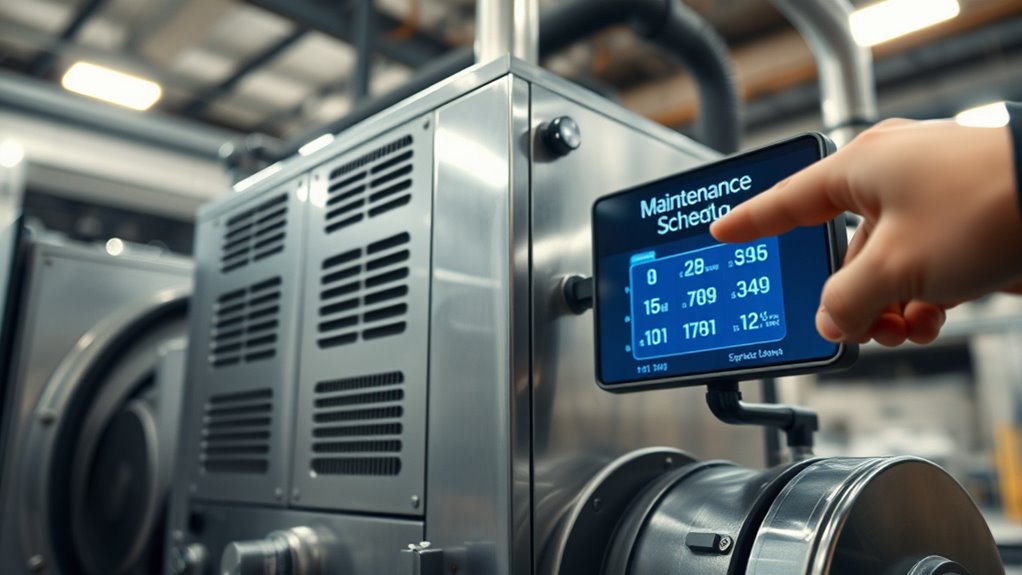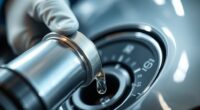To stop guessing your generator’s lifespan and replacement timing, regularly inspect for signs like unusual noises, power fluctuations, or decreased efficiency. Keep up with proper maintenance, and consider the age and usage to gauge when parts may need replacing. Consulting a professional for evaluations guarantees safety and reliability, helping you decide the right moment for replacement before costly failures occur. If you want to make smarter choices, learn what to look for and when to act.
Key Takeaways
- Regular professional inspections assess generator condition, helping determine optimal replacement timing and ensuring safety and reliability.
- Monitor signs like unusual noises, power fluctuations, and increased wear to identify performance decline early.
- Consider age, usage frequency, and maintenance history to predict lifespan and plan timely replacement.
- Proper maintenance, including oil changes and cleaning, extends generator lifespan and prevents unexpected failures.
- Replacing generators proactively before major issues arise reduces repair costs, enhances safety, and improves efficiency.
Understanding Your Generator’s Expected Service Life
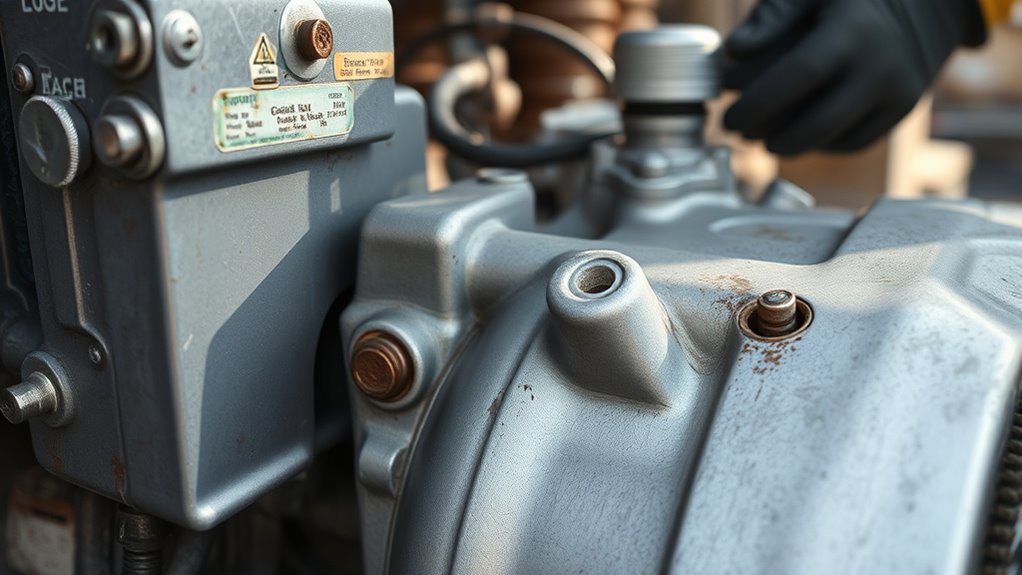
Understanding how long your generator should last is vital for proper planning and maintenance. The expected service life typically ranges from 10 to 20 years, depending on usage and upkeep. To maximize lifespan, consider your generator’s fuel efficiency; a more efficient model consumes less fuel and experiences less strain, extending its durability. Installation location also plays a key role—placing your generator in a dry, ventilated area away from extreme temperatures helps prevent corrosion and overheating. Proper ventilation improves fuel combustion efficiency, reducing wear and tear. Regular maintenance, such as oil changes and inspections, further prolongs its life. Additionally, selecting a generator with a reliable safety features ensures peace of mind during operation. By paying attention to fuel efficiency and choosing the right installation spot, you guarantee your generator remains reliable for years to come.
Key Signs That Indicate Your Generator Is Nearing the End
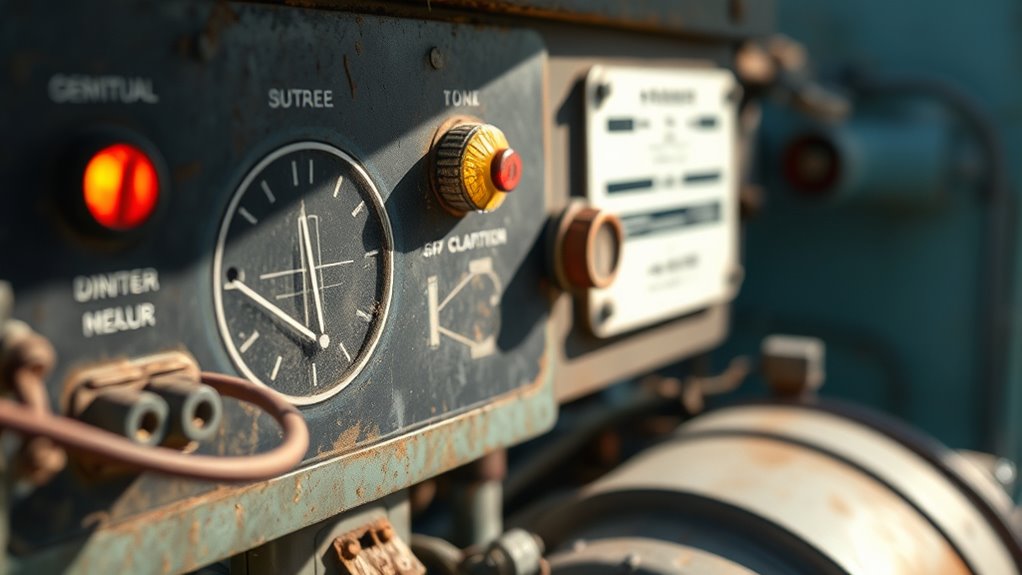
You’ll notice your generator acting up with frequent power fluctuations or inconsistent performance. Unusual noises or loud sounds during operation are also warning signs that something’s wrong. Recognizing these signs early can help you decide when it’s time for maintenance or replacement. Additionally, paying attention to equipment lifespan can ensure safe and reliable operation over time.
Frequent Power Fluctuations
Frequent power fluctuations are a clear sign that your generator may be nearing the end of its lifespan. When your power output varies unexpectedly, it often indicates declining fuel efficiency, meaning the engine struggles to maintain steady performance. These fluctuations can cause inconsistent electricity supply, risking damage to connected devices. Additionally, as your generator wears out, it may produce more noise due to mechanical strain, making it harder to maintain noise reduction. If you notice your generator struggling to provide stable power or requiring more fuel to operate, it’s a sign you should consider replacement soon. Addressing these issues early can save you money and prevent unexpected breakdowns, ensuring reliable power when you need it most. Regular maintenance and monitoring of generator performance can help detect early signs of decline.
Unusual Noise Levels
When your generator starts making unusual noises, it’s a strong indicator that it’s nearing the end of its lifespan. These noise complaints often signal underlying issues that need attention. Pay attention to:
- Loud banging or knocking sounds — these can indicate internal damage or worn-out components.
- High-pitched squeals or whining — often a sign of belt or bearing problems, leading to vibration issues.
- Vibration issues accompanied by unusual noise — if your generator vibrates excessively or produces grinding sounds, it’s a clear warning that parts are failing.
Ignoring these signs can worsen the problem and cause more noise complaints. Addressing unusual noise levels early helps prevent costly repairs and guarantees your generator runs smoothly until its proper replacement time.
Regular Maintenance Checks to Extend Lifespan
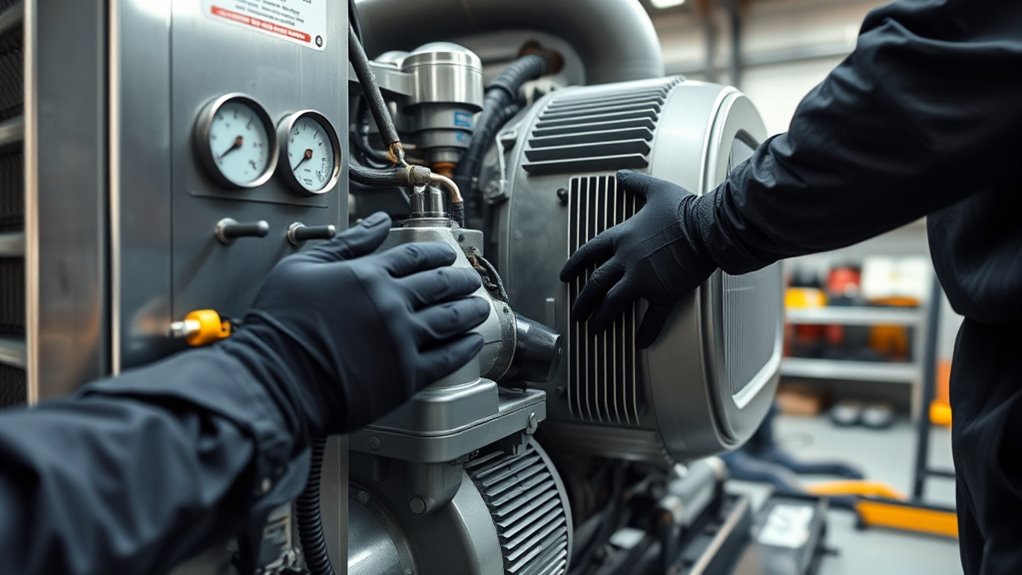
Regular maintenance checks are essential for ensuring your generator operates efficiently and has a longer lifespan. Regular inspections help identify issues early, improving fuel efficiency and preventing costly repairs. Keeping components clean and in good condition reduces unnecessary noise, promoting noise reduction. Schedule routine checks for oil levels, filters, and belts to maintain peak performance. Addressing minor problems promptly extends the generator’s life and ensures reliable power when needed. Use this checklist as a guide:
| Maintenance Task | Benefits |
|---|---|
| Oil and filter changes | Improve fuel efficiency |
| Tightening bolts and belts | Reduce mechanical failures |
| Clean air filters | Enhance noise reduction |
| Check coolant levels | Prevent overheating |
| Inspect electrical connections | Ensure reliable operation |
Proper use of hydrocolloid technology in maintenance can also aid in quickly identifying potential issues by observing changes in component performance.
How Age and Usage Affect Generator Performance
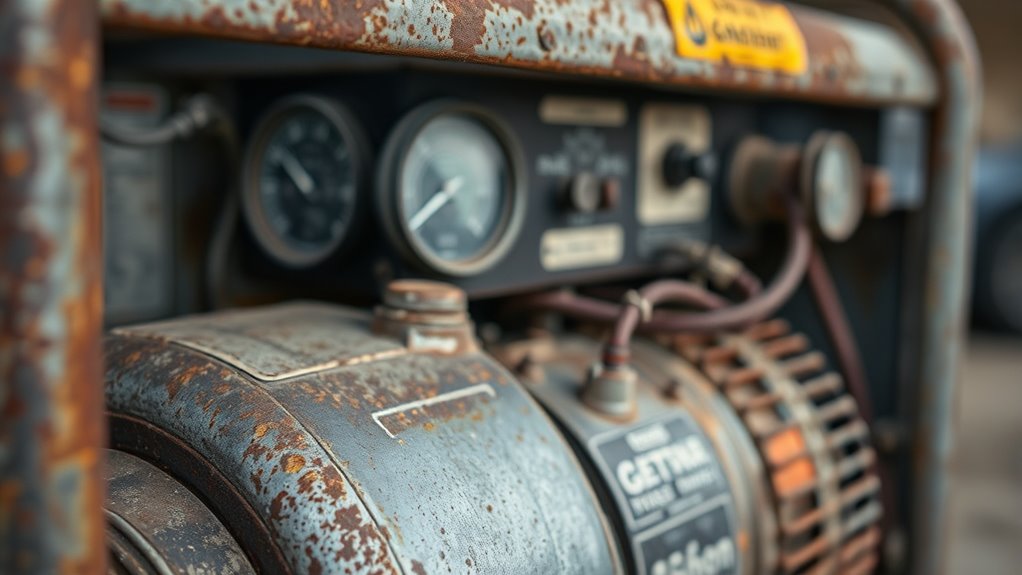
As your generator ages, parts naturally wear down, which can lead to decreased efficiency and increased chances of failure. Frequent usage accelerates this wear, making it essential to monitor performance regularly. Understanding how age and usage impact your generator helps you plan timely maintenance and replacements. Implementing preventive maintenance strategies can further extend the lifespan of your equipment and ensure reliable operation.
Wear and Tear Effects
Over time, wear and tear naturally reduce a generator’s efficiency and reliability. As your generator ages, it’s prone to issues like corrosion damage and component fatigue, which compromise performance. To stay ahead, watch for:
- Corrosion damage: Rust and corrosion weaken metal parts, leading to leaks and failures.
- Component fatigue: Repeated stress causes parts to crack or break, reducing overall reliability.
- Accumulated dirt and grime: Dirt buildup hampers cooling and causes overheating, accelerating wear.
These effects don’t happen overnight but gradually diminish your generator’s ability to perform safely and efficiently. Regular inspections and maintenance can help identify early signs of wear, preventing unexpected breakdowns and costly repairs. Staying proactive guarantees your generator remains dependable when you need it most.
Usage Frequency Impact
The frequency with which you use your generator considerably influences its lifespan and performance. Regular use can maintain engine health, but overuse may cause faster wear, reducing fuel efficiency and increasing environmental impact. Conversely, infrequent use can lead to fuel stagnation and corrosion, risking sudden failures when needed most. To understand this better, consider the table:
| Usage Pattern | Effect on Generator | Impact on Fuel Efficiency | Environmental Impact |
|---|---|---|---|
| Daily use | Keeps parts lubricated | Maintains efficiency | Lower emissions, consistent operation |
| Weekly use | Slight wear, needs maintenance | Slight decline | Moderate impact |
| Infrequent use | Fuel stagnation, corrosion | Reduced efficiency | Higher emissions if not maintained |
| Seasonal use | Long idle periods | Efficiency drops if stored poorly | Increased environmental footprint if neglected |
| Rare use | Potential seizing, damage | Significant decline | Greater environmental harm due to repairs |
Additionally, proper maintenance practices can significantly extend the lifespan of your generator regardless of usage frequency.
Assessing the Cost-Effectiveness of Replacement vs. Repair
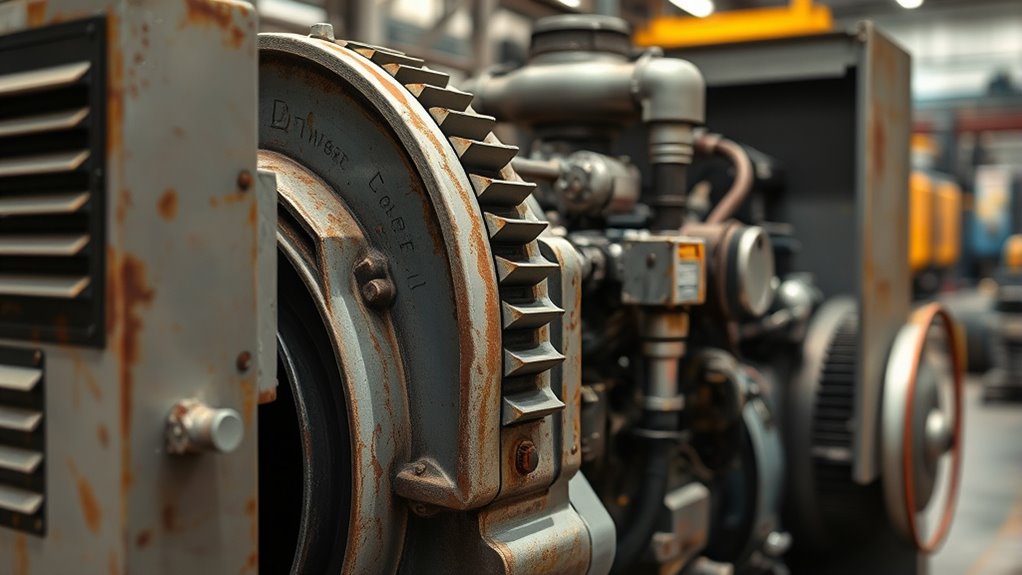
Deciding whether to repair or replace a generator hinges on a careful assessment of costs and benefits. To do this effectively, consider these key factors:
- Cost analysis: Compare repair costs against the price of a new generator, including installation and ongoing maintenance.
- Environmental impact: Replacing an outdated model might reduce emissions and energy consumption, making it more eco-friendly.
- Long-term savings: A newer generator could offer better efficiency, lower fuel costs, and fewer repairs over time.
Choosing the Right Time for Safe and Reliable Replacement
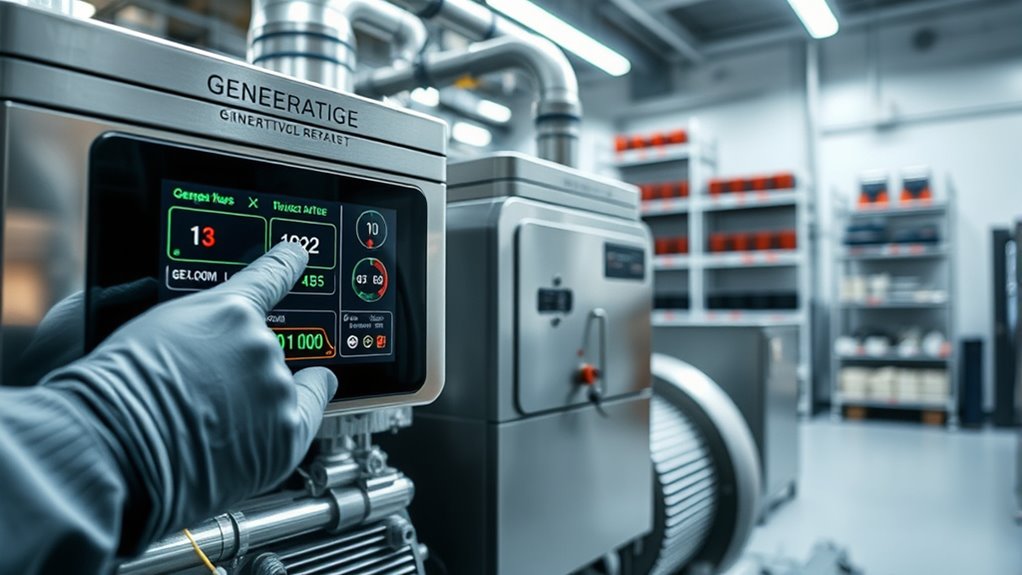
Timing your generator replacement is essential to guarantee safety and reliability. You want to replace it before significant issues arise that could compromise power supply or cause safety hazards. Consider the generator’s age, performance decline, and maintenance history to identify the ideal moment. Replacing at the right time also maximizes fuel efficiency, saving you money over the long term. Additionally, check your warranty coverage; many warranties become void if the generator isn’t replaced within recommended timeframes. Monitoring system performance can help you determine when replacement is necessary, preventing costly repairs or complete failure. Waiting too long risks costly repairs or complete failure, while replacing too early may be unnecessary. By monitoring these factors closely, you facilitate a smooth transition, maintaining dependable power, and protecting your investment. Timing matters—act proactively for safety, efficiency, and peace of mind.
Professional Inspection Tips for Accurate Evaluation

Regular professional inspections play a vital role in accurately evaluating your generator’s condition and determining the right time for replacement. During inspections, focus on key aspects like fuel efficiency, which indicates how well your generator performs over time. Additionally, check for signs of wear that could affect warranty coverage if repairs become necessary. To get the most accurate assessment, consider these tips:
- Inspect fuel lines and filters for clogs or leaks, ensuring peak fuel efficiency.
- Test the load capacity to verify the generator’s ability to handle your power needs.
- Review maintenance records to identify recurring issues that might signal impending failure or warranty concerns.
Professional evaluations help prevent guesswork, extend lifespan, and guarantee your generator operates safely and efficiently.
Frequently Asked Questions
How Do Environmental Conditions Impact Generator Lifespan?
Environmental factors like humidity, temperature, and exposure to dust or corrosive elements directly impact your generator’s lifespan. High humidity can cause rust, while extreme temperatures strain components. Regular maintenance practices, such as cleaning, inspecting, and protecting your generator from harsh conditions, help mitigate these effects. By addressing environmental challenges proactively, you extend your generator’s durability, ensuring it operates safely and efficiently for years to come.
Can Generator Brand Influence Replacement Timing?
You might worry that brand doesn’t matter, but it does influence when you should replace your generator. A reputable brand with strong warranty coverage offers better durability and clearer guidance on lifespan. This peace of mind guarantees you’re not left guessing, especially during power outages. Stick with trusted brands, and you’ll benefit from quality, support, and a more accurate timeline for replacement, keeping your home safe and reliable.
What Insurance Considerations Exist for Generator Replacement?
Your insurance coverage can impact generator replacement costs, so it’s crucial to review your policy. Some policies may cover damage or failure, reducing your out-of-pocket expenses. Contact your insurer to understand what’s included, especially regarding replacement costs. Keep records of repairs and upgrades, as these can influence claims. Knowing your coverage ensures you’re prepared financially, avoiding surprises when it’s time to replace your generator.
Are There Legal Regulations Affecting Generator Disposal?
Yes, legal regulations affect generator disposal. You must follow hazardous waste disposal regulations to prevent environmental harm. This includes properly handling and recycling or disposing of generator parts, especially batteries and fuel tanks, which are considered hazardous waste. Failing to comply can lead to fines or legal issues. Always check local, state, and federal laws to ensure your generator disposal complies with all safety and environmental standards.
How Do Different Fuel Types Affect Generator Longevity?
Think of your generator as a race car; the fuel type you choose impacts its speed and durability. Gasoline generators often have shorter lifespans but are easy to maintain, while diesel ones offer better fuel efficiency and longevity with strict maintenance schedules. Propane generators are cleaner but may need extra care. Selecting the right fuel aligns with your maintenance routine, ultimately extending your generator’s lifespan and ensuring reliable power when needed.
Conclusion
Knowing when to replace your generator isn’t a shot in the dark. By paying attention to signs of wear, sticking to maintenance schedules, and consulting professionals, you can make a smart call before trouble strikes. Remember, it’s better to be safe than sorry—you don’t want to be caught out in the cold. Stay proactive, and you’ll keep your power running smoothly, proving that a stitch in time truly saves nine.
